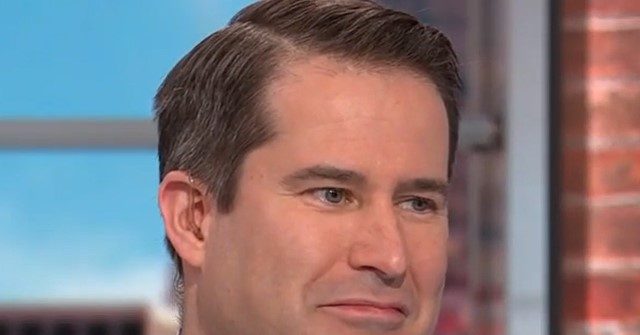A Stunning Accusation: Representative Seth Moulton Speaks Out
In a bold move that captured the attention of political observers nationwide, Representative Seth Moulton (D-MA) appeared on CNN’s “OutFront” andmade a startling accusation. Moulton asserted that President Donald Trump was “selling out Ukraine to Russia.” This statement came during a discussion on the program, highlighting the tense dynamics between the U.S., Ukraine, and Russia. The context of Moulton’s accusation is deeply rooted in the ongoing conflict in Ukraine, where the nation has faced relentless aggression from Russia. Moulton’s words underscore the growing concern among some lawmakers about Trump’s approach to foreign policy, particularly regarding Russia and Ukraine.
The significance of Moulton’s accusation lies in its implications for U.S. foreign relations. By alleging that Trump is complicit in betraying Ukraine, Moulton touches on a sensitive nerve in international diplomacy. His statement suggests a divergence from traditional U.S. support for Ukraine, raising questions about the administration’s priorities and allegiances. This accusation not only reflects Moulton’s perspective but also resonates with those who are critical of Trump’s handling of geopolitical crises.
The Refusal to Label Putin: A Point of Controversy
Host Erin Burnett introduced a pivotal moment from a recent press conference where Trump declined to label Vladimir Putin a dictator. Burnett’s observation highlighted the inconsistency in Trump’s terminology, especially considering his willingness to criticize other leaders. The clip played during the show revealed Trump’s cautious approach to labeling Putin, stating, “I don’t use those words lightly. I think that we’re going to see how it all works out.” This response has sparked debate, as it contrasts with Trump’s readiness to criticize other leaders, including Ukraine’s President Volodymyr Zelensky.
The refusal to call Putin a dictator is controversial because it suggests a hesitancy to confront Russia’s actions on the global stage. Critics argue that such restraint undermines the U.S.’s role as a defender of democracy and human rights. Burnett’s question to Moulton—why Trump would label Zelensky a dictator but not Putin—cuts to the heart of this controversy, implying a double standard in Trump’s foreign policy approach.
Trump’s Perspective: A Cautious Approach to Labels
Trump’s response during the press conference reflects his broader approach to diplomacy, characterized by a reluctance to use strong language against certain leaders. His cautiousness regarding labels like “dictator” might stem from a desire to maintain open communication channels with Russia. Trump has often emphasized the importance of building relationships with foreign leaders, even those with questionable human rights records. However, this approach has drawn criticism for appearing to legitimize authoritarian regimes.
The debate over labeling leaders highlights the complexities of diplomatic language. While some argue that such labels are necessary to denounce human rights abuses, others believe that diplomacy requires a more nuanced approach. Trump’s stance on this issue has left many puzzled, particularly given his administration’s actions towards other nations. The tension between rhetorical condemnation and pragmatic diplomacy remains a central theme in evaluating Trump’s foreign policy decisions.
The Comparison Between Zelensky and Putin: A Question of Motive
Erin Burnett’s inquiry into Trump’s differing treatment of Zelensky and Putin probes deeper into the motivations behind his foreign policy decisions. Moulton’s response to Burnett’s question was unequivocal, asserting that Trump’s actions amount to a betrayal of Ukraine in favor of Russia. This accusation suggests a deliberate shift in U.S. policy that could have far-reaching consequences for the region and beyond.
Exploring this double standard reveals underlying themes in Trump’s foreign policy. Critics argue that Trump’s praise for authoritarian leaders like Putin, coupled with criticism of democratic leaders like Zelensky, indicates a preference for strongman governance. This perspective raises concerns about the erosion of democratic values in U.S. foreign relations. The logical conclusion, as Moulton suggests, is that Trump’s actions are tantamount to siding with Russia against Ukraine, a move that could destabilize Eastern Europe and weaken NATO alliances.
The Consequences of Trump’s Stance: A Betrayal of Ukraine?
Representative Moulton’s assertion that Trump is selling out Ukraine to Russia is a grave accusation with significant implications. It suggests that the U.S. is abandoning a democratic ally in favor of a geopolitical competitor. Ukraine’s resilience in the face of Russian aggression has been a testament to its people’s resolve, yet Moulton argues that Trump’s actions undermine this effort. The thought that a U.S. president would betray Ukraine, a nation fighting for its sovereignty, is, as Moulton put it, “unbelievable.”
The consequences of such a betrayal would extend beyond Ukraine. It could embolden Russia to pursue further aggression, challenging the balance of power in Europe. Additionally, it may erode trust in the U.S. as a reliable ally, affecting partnerships worldwide. Moulton’s statement serves as a call to action, urging policymakers and citizens to recognize the gravity of the situation and the need to reassess U.S. foreign policy priorities.
The Broader Implications: A Shift in Geopolitical Dynamics
The broader implications of Trump’s stance on Ukraine and Russia point to a potential shift in geopolitical dynamics. If the U.S. continues to distance itself from Ukraine, it may create a power vacuum that Russia could exploit. This scenario raises concerns about the future of democracy in Eastern Europe and the strength of NATO alliances. The international community is closely watching these developments, as they could signal a significant change in global power structures.
Furthermore, Trump’s approach to foreign policy challenges the traditional role of the U.S. as a champion of democracy. The reluctance to criticize authoritarian leaders while attacking democratic ones complicates U.S. relations with both allies and adversaries. As debates over Trump’s foreign policy continue, the focus will remain on whether this approach serves the nation’s long-term interests or undermines its global influence. The stakes are high, and the outcome could shape international relations for years to come.


